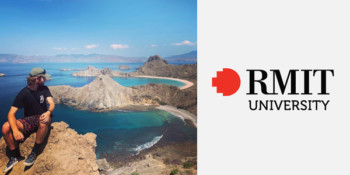Lachlan Colgrave is a 2019 New Colombo Plan mobility grant recipient from RMIT University. Lachlan undertook the Development Studies Immersion Program at Universitas Gadjah Mada in Semester 2, 2019.
Q: Why did you decide to undertake ACICIS’ Development Studies Immersion Program (DSIP) ?
For some time, I had been humming and hawing over whether ACICIS DSIP program would be for me, yet alone a visit to Indonesia. A good friend of mine had recommended the program after travelling together in India and I finally decided, despite my reservations, it’s always better to regret doing something rather than regret not doing it! And I can assure you, I have no regrets joining ACICIS DSIP program. Indonesia is a great escape, a different culture both challenging and enriching and a place away from home which allows for plenty of reflection. If you’re reading this testimonial now, you’re clearly thinking about it… just do it! You have nothing to lose.
Q: Did you receive a New Colombo Plan Mobility Grant? If so, how did this contribute to your experience in Indonesia?
The NCP mobility grant was a powerful tool enabling me to undertake travel and find affordable accommodation in Yogyakarta that completely met my needs. I would have not come to Indonesia without NCP and I’m very grateful for the opportunity it has given me, the friends I’ve made and the remarkable experiences that followed. The way NCP allows you to grow professionally and personally is insurmountable.
Q: Are you involved in any clubs/societies at the university?
I’m part of the Australia-Indonesia Youth Association which is a great place to meet new friends. One of my favourite activities is the weekly futsal they put on (which I’m awful at – but that makes it even more fun). Outside my studies I also took up Muay Thai with a group of great people that I met from other ACICIS programs. This is just a vignette of how new friendships lead to unlikely things – I’d never have seen myself doing push-kicks or sparring Jogja locals at any stage, especially when I consider eating food and sleeping two of my major hobbies.
Q: How will the DSIP influence your future career or study?
I have slightly fallen in love with Indonesia. It is clear to me, for a reason I don’t know how to describe, that I’ll be coming back to Indo and Jogja in one way or another, be it study or work. Indonesian is a great language to learn for beginners and is definitely steering me towards a future career that involves its use.
Q: How does development in Indonesia differ to what you’ve seen before?
Development in Indonesia is an interesting case study that contrasts what I’ve previously seen through its differing cultural realities. For those who are interested in development, ACICIS makes engaging with these developmental realities very accessible and palatable to beginners. Visiting communities and working with partnered NGOs and lecturers to understand development from an Indonesia perspective attributed to a process of unlearning for me. What I had previously been taught at university or learned within village communities in India were distinct from the development challenges faced in Indonesia. I learnt ‘development’ isn’t an umbrella term to be generalised in the Global South and surprisingly found myself interested in community mental health.
Q: What do you like to do in your spare time in Yogyakarta?
I enjoy reading a good book or doing some work at one of Jogja’s many cafes or collaborative spaces. For those who know Melbourne, it reminded me a lot of home, coffee and open, funky architectural places being a must do for chill time. Going on day trips with friends and grabbing a drink or bite to eat was also a favourite. Even heading to the movies or getting a massage was a good way to wind down.
Q: Are you undertaking an internship or student community service (KKN) while in Indonesia?
Center for Digital Society (CfDS) is a research centre established under the Faculty of Social and Political Sciences, Universitas Gadjah Mada. I helped make research there, having two papers published to date and presenting one of them at a public Diffusion in a cafe. Many of my colleagues at CfDS were young and fun! This was my first time undertaking professional research and it was great to have the support and guidance of such a friendly workplace to do this. Additionally, it was insightful to contrast this experience with an additional internship.
Yayasan SATUNAMA is a non-profit organisation engaged in community empowerment through assistance, advocacy, and training. Kesehatan Jiwa is SATUNAMA’s mental health program which aims to defend and ameliorate the dignity of groups and individuals who experience mental health problems. Advocacy and training intends to put an end to stigma (which is a predominant issue in Indonesia) within community. I reached out to Australian not-for-profits in building a partnership with SATUNAMA and am continuing to do so alongside translation of documents into English.
Q: Favourite Indonesian food/place to eat:
Ayam geprek and Batagor telur are two favourites and I really enjoyed the FISIPOL and FIB canteens at UGM alongside Indochine restaurant and Papricano in south Jogja. Don’t worry, there’s also a Maccas on Jalan Kaliurang.
Q: Favourite Indonesian word/phrase:
Polisi tidur – literally “sleeping police” or speedhump
Q: What places in Indonesia have you visited during your Semester so far?
I’ve visited family in Bali as well as gone on trips with friends to Lombok, Gili Islands, Karimunjawa and Labuan Bajo/Komodo Island. There are some great adventure spots along the coast of Gunung Kidul and trips up to Merapi and Borobudur of course!


